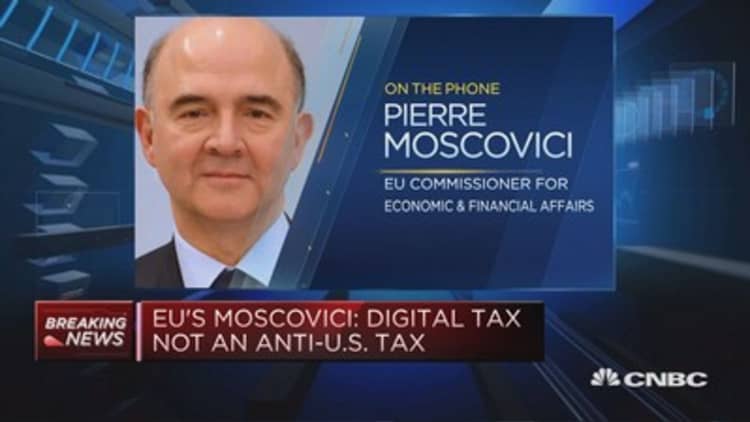
Tech giants including Google, Amazon and Facebook could soon face higher taxes in Europe.
The European Commission — the executive arm of the European Union (EU) — unveiled plans Wednesday to tax companies where they actually generate business, rather than where they are headquartered.
The proposed changes to how digital businesses are taxed could substantially increase the amount such firms have to pay in taxes. It says those firms with significant online revenues should pay a 3 percent tax, but it would only apply to certain online revenue streams like the sale of user data or online advertising.
According to data from the European Commission, digital companies pay on average an effective tax rate of 9.5 percent — compared to 23.2 percent for traditional businesses.
"The digital revolution has overturned our economies and also shaken profoundly the way businesses create value today," Pierre Moscovici, the EU's commissioner for taxation said at a press conference on Wednesday, arguing that the current rules are outdated.
"The idea is to ensure equal treatment and fairer taxation," he said.
In more detail, the proposals include a "common EU solution" which would allow member states to tax profits that are generated in their territory, even if these companies do not have a physical presence there. But, a company would have to fulfill one of the following criteria: its annual revenues in a European country exceeds a 7 million euro ($8.6 million) threshold; it has more than 100,000 users in a taxable year; or over 3,000 business contracts for digital services are created between the company and its users in a taxable year.
However, and perhaps more importantly, the plans from the European Commission also include an interim tax measure. This would mean that those activities which are not currently taxed would begin to generate immediate revenues for EU member states. This aims to stop countries taking unilateral actions, creating distortions in the European market, until the long-term solution is applied.
It would tax revenues from selling online advertising space; from digital activities which allow users to interact with other users; and from the sale of data generated from user-provided information.
This interim tax would be applied to companies with annual global revenues of over 750 million euros ($920.94 million) and EU revenues of over 50 million euros. This is to ensure that smaller digital companies will not be held back. According to the European Commission, if member states implement the proposed digital tax of 3 percent, they could generate about 5 billion euros in revenues per year.
'This is not an anti-US tax'
Speaking to CNBC, following the announcement, Moscovici said the new rules aren't a specific decision to target U.S. companies.
"It is not an anti-U.S. tax," he said, "It is just about taxing properly those companies who generate value through digital activity in Europe."
"It's not a response to this or that decision taken by the U.S. administration recently, whether it's tax reform or trade measures," Moscovici said.
The relationship between the U.S. and Europe has suffered a setback recently, after President Donald Trump announced new tariffs on steel and aluminum on the basis of national security. Europe, a traditional ally of the U.S. doesn't agree with the U.S. reasoning, and is currently looking to be exempted from those measures.

Commenting on Wednesday's proposals, Ireland's Finance Minister Paschal Donohoe said they should be viewed in the context of an OECD report released last week.
Donohoe said it was worth noting that the report "did not find consensus among countries on this issue."
In 2015, following pressure from the European Commission, Ireland was forced to end the "double Irish" tax loophole that had benefited a number of big tech companies and other multi-nationals.
This tax had allowed big firms to channel royalty payments for intellectual property from one Irish subsidiary company to another that was based in a tax haven.



